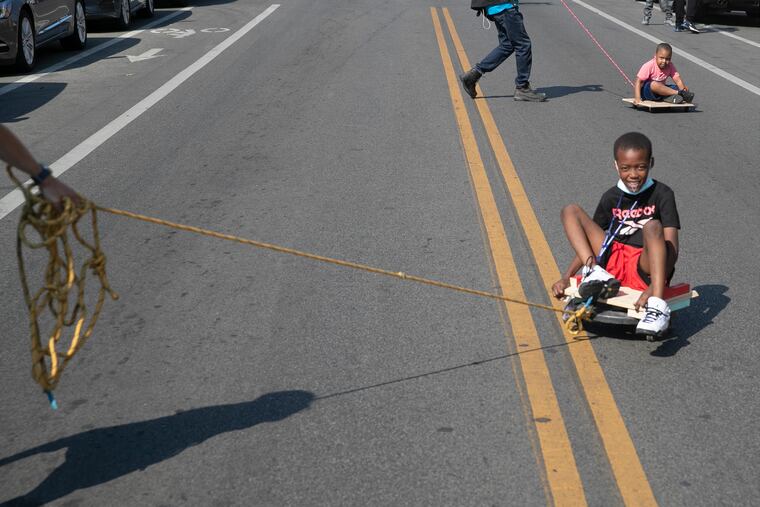Philly’s nonprofits already fight to stem the bleeding of gun violence | Opinion
But they're going to need more strategic support to turn competing soloists into a choir.

When I read about the city’s new violence reduction initiative — $155 million committed in next year’s budget — I was especially excited by the $21 million for grassroots organizations working to address gun violence. I spent 2020 coordinating volunteers for Manup Phl, a nonprofit working to reduce gun violence by connecting at-risk men to mentoring and resources (and led by Inquirer columnist Solomon Jones). I know firsthand how much passion and potential lie within these organizations. But if the city wants fewer murders, it must not simply give money to grassroots organizations. It has to strategically invest in their success.
Set big, clear goals: Countless organizations serve varied missions from mentoring to job training/placement, violence interruption, and victim support. All work — often competing — to make an impact. But there’s no common strategic vision and little coordination. The result is what feels like a collection of soloists, when what we need is a choir.
» READ MORE: Philly is pouring millions into violence prevention as shootings soar. What does that money buy?
The city must paint a clear vision of what it wants to achieve and set aggressive goals. They wouldn’t override the visions of nonprofits but would provide a city-wide plan that grassroots organizations can get behind. Since mentoring has been effective, one goal could be to have 20% of males age 14 to 18 in the two most violent zip codes in a structured mentoring program. The city would need to define minimum key elements and measurable goals for the initiative so organizations (and the public) understand expectations.
This would increase cooperation by connecting organizations to a broader effort, improve services by outlining minimum standards, and finally quantify the collective impact of grassroots organizations by using standardized metrics.
Create a directory: Because the many organizations offering resources operate independently, people seeking support have to navigate a patchwork of providers for help.
The city should add a violence reduction organizations directory to 311. This would require defining key metrics to describe organizations and putting out an open call for organizations to provide that information. (Deana Gamble in the mayor’s office said they are working on a database of city programs, grant-funded programs, and partner services to share on phila.gov.)
Fund shared services: At ManUp Phl, I spent countless hours building contact databases, documenting volunteer processes, and launching the case management system — administrative work that is necessary but not directly related to fulfilling the core mission. This scenario repeated across dozens of organizations adds up to weeks or even months of precious time not spent directly working to reduce gun violence.
The city should provide consulting services to grassroots organizations for the administrative and technical work not core to their mission, similar to the shared services collaborative started by several nonprofits in Michigan. After gathering feedback on what services should be outsourced, the city would hire a consultant to focus on this support and establish criteria to determine how consulting time is allocated to organizations.
More working, less “hearing”: There’s an endless flow of hearings and meetings about gun violence. At one hearing where I gave comments, I recall looking around the church filled with engaged citizens and politicians and earnestly wondering: What’s the point? My indifference changed to frustration when I wasted hours following up with one elected on a promise for support that never materialized. It felt as if the passionate speeches, rounds of applause, and thoughtful questions yielded few tangible results. While hearings have their place, the hard follow-up work of problem-solving, planning, and executing matters.
» READ MORE: Adding millions to violence prevention efforts is a waste without evaluation | Opinion
A portion of city funding should go toward facilitated working sessions that help grassroots organizations build capacity and troubleshoot problems. These sessions would focus on organizational development such as empowering volunteers, evaluating work processes and strategic planning. And they should be open only to grassroots organizations addressing gun violence, creating networking opportunities and building rapport for future collaboration.
Make collaboration pay: There’s strength in numbers, but with grassroots organizations all competing for the same pot of grants, cooperation can be a financial liability, discouraging groups from sharing contact lists, best practices, or other “proprietary” information. For that reason, the city should designate a portion of funding specifically for group grant proposals, requiring applicants to outline how they’ll share resources and information to increase efficacy.
The $21 million investment is a good start. But without strategic support, the dollars are unlikely to yield change.
Jasmine Schley is pursuing an Urban Strategy Masters and is a meeting facilitation and professional skills training consultant based in Mount Airy.